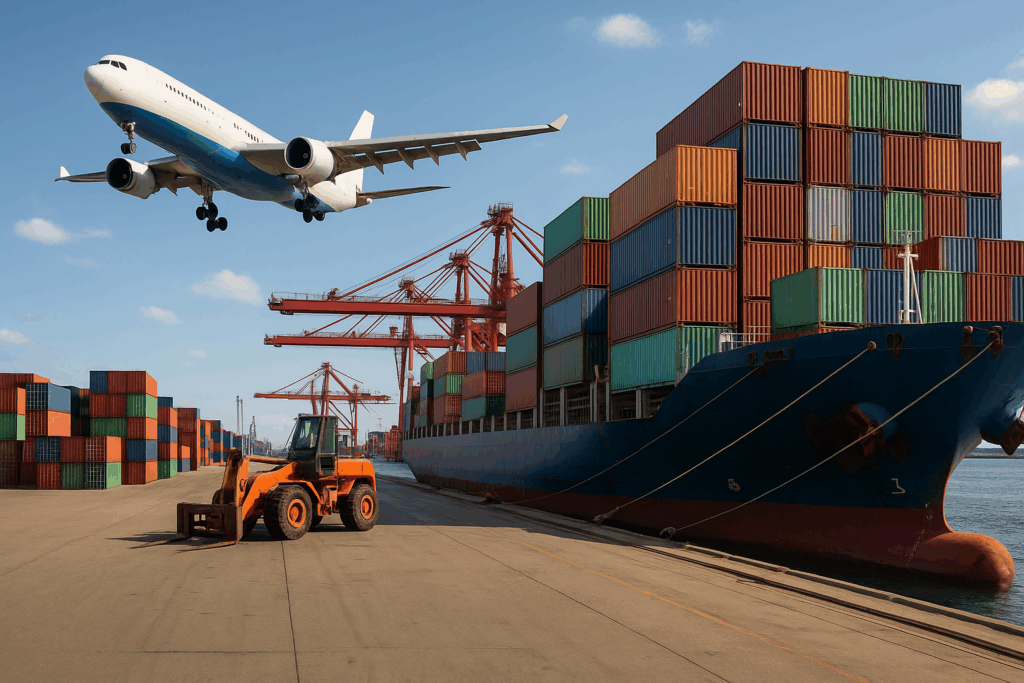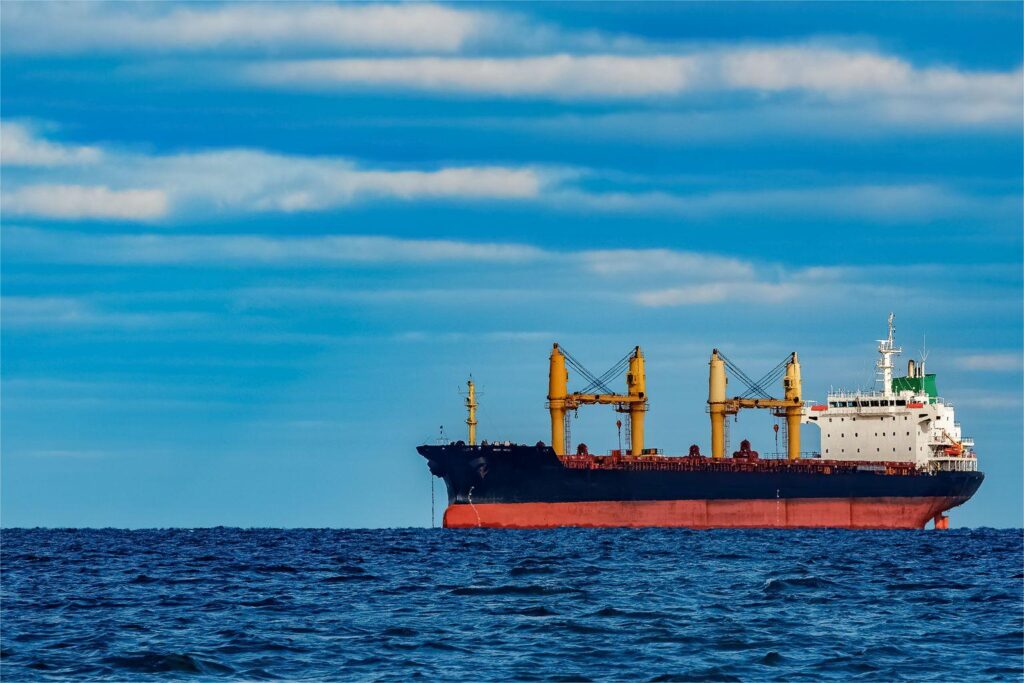- By TOP CHINA FREIGHT
- August 19, 2025
- Shipping
Table of Contents
Discover everything you need to know about freight forwarding from China to Pakistan. Learn about various shipping methods including air, sea, and rail freight, as well as costs, customs requirements, and essential tips for a smooth shipping experience. Choose a reliable freight forwarder in China to Pakistan to ensure timely, cost-effective, and efficient delivery of your goods.

Introduction to Freight Forwarding from China to Pakistan

Freight forwarding is the backbone of global trade, particularly when shipping between China and Pakistan. As two major trading nations, understanding how to navigate shipping methods, costs, customs, and regulations is essential for businesses. Whether you are sending electronics, textiles, or machinery, a freight forwarder in China to Pakistan can simplify logistics and ensure timely delivery.
Choosing the right freight forwarder can help reduce overall costs, ensure safe transport, and manage any unforeseen challenges that may arise during the shipping process.
Shipping Methods from China to Pakistan
Shipping from China to Pakistan involves multiple transport modes, each with its own set of benefits and challenges. Whether you choose air, sea, rail, or opt for door-to-door services, understanding each method helps in selecting the best solution based on your budget and needs.
Air Freight

Air freight is often chosen for its speed. For businesses requiring fast delivery, air transport can bring goods to Pakistan in as little as 3-5 days. However, the cost is considerably higher than sea and rail freight, making it ideal for small, high-value, and urgent shipments.
| Advantages | Disadvantages |
|---|---|
| Fastest mode of transport | Expensive per kg |
| Reliable for small shipments | Limited capacity for bulky goods |
| Ideal for perishable or high-value goods | Restrictions on certain types of cargo |
Sea Freight

Sea freight remains the most cost-effective option for bulkier shipments. While slower than air freight, sea freight offers significant savings for large and heavy cargo. Transit times can range between 20-30 days, and you can choose between Full Container Load (FCL) or Less than Container Load (LCL) depending on your needs.
| Advantages | Disadvantages |
|---|---|
| Affordable for bulk shipments | Longer transit time (20-30 days) |
| Suitable for heavy and large goods | Requires port-to-port service |
| Multiple container options (FCL, LCL) | Potential delays in customs |
Rail Freight

Rail freight between China and Pakistan, particularly via the China-Pakistan Economic Corridor (CPEC), is a growing option that combines the speed of air freight with the affordability of sea freight. It is particularly beneficial for goods that need to be transported over land and requires minimal port handling.
| Advantages | Disadvantages |
|---|---|
| Cost-effective for large shipments | Not as fast as air freight |
| Ideal for land-based trade routes | Limited availability depending on destination |
| Environmentally friendly | Potential delays due to border crossings |
Door-to-Door Service

For businesses seeking hassle-free solutions, door-to-door service can be a perfect fit. This option covers everything from pick-up at the origin in China to final delivery at the destination in Pakistan. It includes transport via multiple methods (air, sea, rail) and handles all the complexities, such as customs clearance and last-mile delivery.
| Advantages | Disadvantages |
|---|---|
| End-to-end solution | More expensive than port-to-port services |
| Simplifies the logistics process | Requires coordination with the freight forwarder |
| Convenient for customers | May involve additional handling fees |
Shipping Costs from China to Pakistan
Shipping costs depend on multiple factors: the shipping method, cargo size, and the freight forwarder. Below is a comprehensive cost breakdown for different shipping options.
Air Freight Costs
For air shipments, the cost is generally determined by the weight and size of the goods, with most freight forwarders calculating rates per kilogram.
| Weight Range | Estimated Cost per kg | Transit Time |
|---|---|---|
| 0-100 kg | $3 – $5 | 3-5 days |
| 100-500 kg | $2.8 – $4.5 | 3-5 days |
| Over 500 kg | $2 – $3.5 | 3-5 days |
Sea Freight Costs
Sea freight offers a variety of options, such as Full Container Load (FCL) and Less than Container Load (LCL), with costs varying based on container size and cargo volume.
| Container Type | Estimated Cost | Transit Time |
|---|---|---|
| 20ft FCL | $800 – $2,000 | 20-30 days |
| 40ft FCL | $1,200 – $3,000 | 20-30 days |
| LCL (per cubic meter) | $60 – $100 | 20-30 days |
Rail Freight Costs
Rail freight, due to its integration into the CPEC corridor, provides an affordable and viable alternative to sea and air freight for medium and large shipments.
| Route | Estimated Cost per Container | Transit Time |
|---|---|---|
| China to Pakistan (via CPEC) | $500 – $1,000 | 10-15 days |
| China to Pakistan (rail) | $400 – $900 | 10-15 days |
Door-to-Door Costs
Door-to-door services include all logistics elements such as freight, customs handling, warehousing, and final delivery. The cost for this option will depend on the shipping method used and the specific requirements for delivery.
| Service Type | Estimated Cost | Transit Time |
|---|---|---|
| Air Freight (door-to-door) | $3 – $6 per kg | 5-7 days |
| Sea Freight (door-to-door) | $1,000 – $2,500 per container | 30-40 days |
| Rail Freight (door-to-door) | $600 – $1,200 per container | 15-20 days |
Customs and Documentation
Customs clearance is crucial for international shipping. Freight forwarders play a key role in ensuring that all the necessary documents are submitted to prevent delays and penalties.
Required Documents:
- Commercial Invoice
- Bill of Lading
- Packing List
- Certificate of Origin
- Import/Export Licenses
- Insurance Certificates
- Customs Declarations
A freight forwarder in China to Pakistan will handle these documents, ensuring compliance with both countries’ regulations.
Choosing the Right Freight Forwarder
Selecting a freight forwarder in China to Pakistan is essential for ensuring timely delivery, cost-effective transport, and smooth operations. Consider the following factors when choosing your freight forwarder:
| Factor | Why It’s Important |
|---|---|
| Experience | A forwarder with expertise in the China-Pakistan route will streamline logistics and reduce potential delays. |
| Reputation | Look for a provider with positive customer reviews and transparent services. |
| Cost Effectiveness | Compare quotes from different providers to get the best value for your shipment. |
| Customs Expertise | Ensure the forwarder is knowledgeable in handling both Chinese and Pakistani customs regulations. |
Additional Services Offered by Freight Forwarders
Many freight forwarders provide additional services to help optimize the shipping process and provide greater convenience for businesses.
| Service | Description |
|---|---|
| Warehousing | Provides storage solutions before shipment. |
| Insurance | Protects goods against loss or damage during transport. |
| Packing Services | Offers packaging solutions to reduce damage and optimize space. |
| Tracking Services | Real-time shipment tracking for visibility. |
| Door-to-Door Service | Includes pick-up and delivery from the origin to the destination address. |
Best Practices for Efficient Shipping
Allow time for logistics, customs clearance, and potential delays.
Combining multiple shipments into one can reduce transportation costs.
Stay updated on the latest tariffs, duties, and documentation requirements.
Properly packed goods minimize damage and help reduce shipping costs.
Conclusion
Shipping from China to Pakistan offers multiple options, including air freight, sea freight, rail, and door-to-door services. Each shipping method has its advantages, and the right choice depends on your needs for speed, cost, and shipment size. By selecting a reliable freight forwarder in China to Pakistan, you can streamline the process, save on costs, and ensure timely delivery of your goods. With the right partner, shipping can be smooth, efficient, and cost-effective, ensuring your business operations run without interruptions.
Need a Shipping Quote?
If you want expert guidance and peace of mind, our team is ready to assist.
TJ China Freight offers tailored solutions to help businesses of all sizes ship more reliably from China.
FAQs
Q1:How long does it take to ship goods from China to Pakistan?
Shipping times vary depending on the method chosen:
- Air Freight: 3-5 days
- Sea Freight (FCL or LCL): 20-30 days
- Rail Freight: 10-15 days (via the China-Pakistan Economic Corridor)
- Door-to-Door: Typically 5-7 days for air freight, 30-40 days for sea freight.
Q2:How much does it cost to ship from China to Pakistan?
The cost of shipping depends on various factors like the shipping method, the size and weight of your goods, and additional services. Here’s an estimate for each method:
- Air Freight: $3 – $5 per kg
- Sea Freight (FCL): $800 – $2,000 per 20ft container
- Rail Freight: $500 – $1,200 per container
- Door-to-Door (Air Freight): $3 – $6 per kg
Q3:How can I track my shipment from China to Pakistan?
Most freight forwarders provide tracking services for shipments. If you’re using air or sea freight, you can track the shipment using the Bill of Lading (BOL) number or Air Waybill (AWB) number. For door-to-door services, tracking is often available through a dedicated portal provided by your freight forwarder.
Q4:What documents are required for shipping from China to Pakistan?
Key documents required for shipping goods from China to Pakistan include:
- Commercial Invoice
- Bill of Lading
- Packing List
- Certificate of Origin
- Import/Export Licenses
- Insurance Certificates (if applicable)
- Customs Declarations
Your freight forwarder will assist in ensuring all documentation is accurate and compliant with both Chinese and Pakistani regulations.
Q5:Can I ship small items using sea freight?
Yes, you can ship small items via sea freight, but it may not be the most cost-effective method unless you have enough goods to fill a container. For smaller shipments, Less than Container Load (LCL) is an ideal solution, allowing you to share container space with other shipments. LCL is more affordable for businesses shipping small quantities but requires additional handling time.
